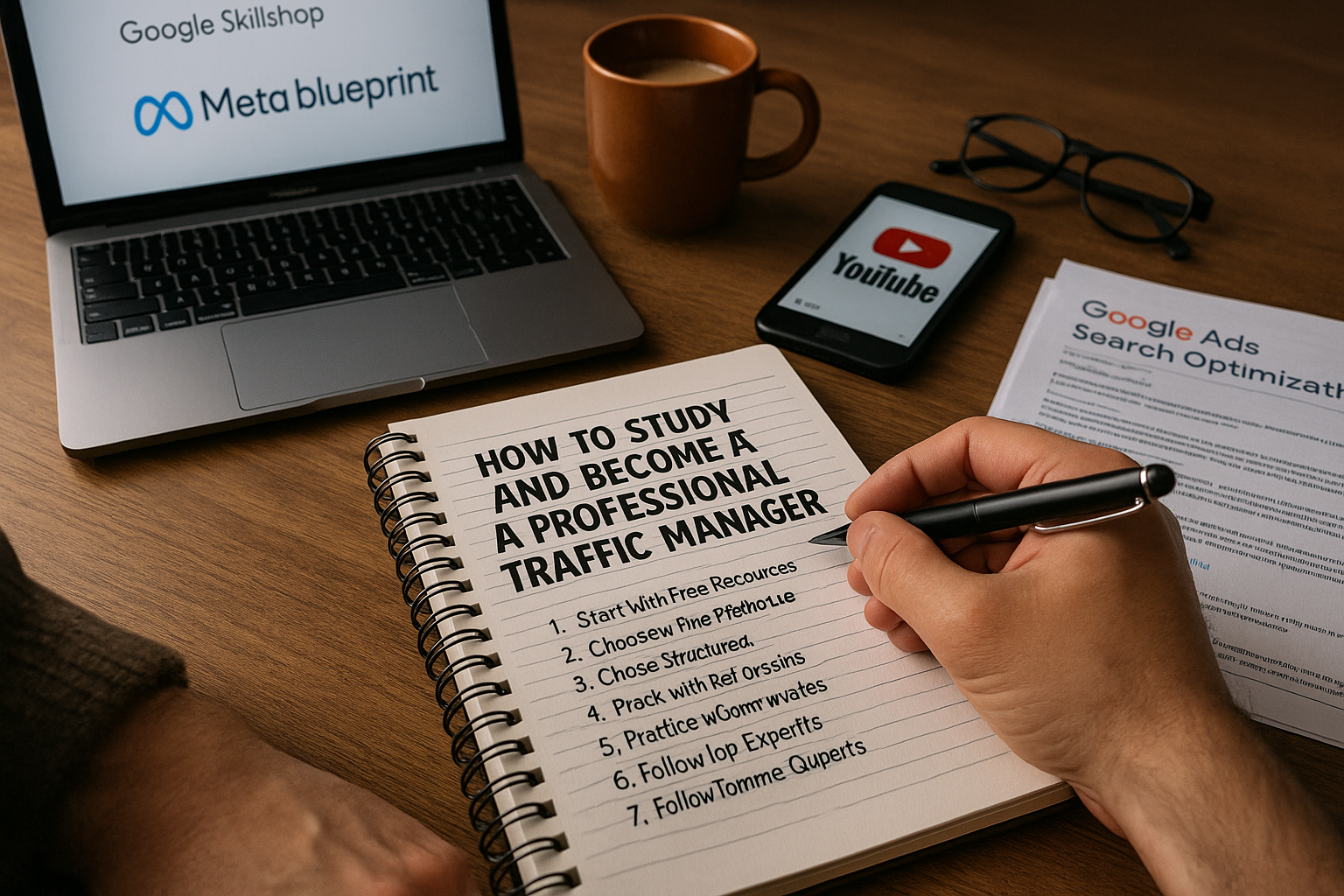With the rapid growth of online businesses, e-commerce, and digital marketing, the demand for professional traffic managers has never been higher. Whether you’re looking to start from scratch or shift into a high-demand career, studying to become a traffic manager is a smart move.
In this article, you’ll learn what to study, where to find quality resources, and how to build real skills that set you apart in the competitive world of media buying and digital traffic management.
What Does a Traffic Manager Do?
A traffic manager is responsible for planning, executing, monitoring, and optimizing online ad campaigns. They work with platforms like Meta Ads (Facebook and Instagram), Google Ads, TikTok Ads, and others to bring traffic to websites, landing pages, e-commerce stores, or apps.
The ultimate goal is to turn paid clicks into profitable actions, like purchases, sign-ups, or leads.
To do that well, a traffic manager needs both technical and strategic skills, plus a good understanding of human behavior and marketing principles.
Skills You Need to Become a Traffic Manager
Here are the core skills every aspiring traffic manager should develop:
- Understanding of Digital Marketing Fundamentals
Learn how sales funnels work, customer journeys, and the difference between traffic, conversion, and retention. - Mastery of Ad Platforms
Get hands-on experience with platforms like Meta Ads Manager, Google Ads, TikTok Ads, and LinkedIn Ads. - Copywriting for Ads
The ability to write ad headlines, primary texts, and calls to action that convert. - Basic Design or Creative Direction
You should at least know how to brief designers or use tools like Canva for simple creatives. - Analytics and Optimization
Learn to read performance data (CPC, CTR, CPL, ROAS) and make decisions based on those insights. - Client Communication and Reporting
If you work with clients, being able to explain what’s working and what needs improvement is key.
Step-by-Step Guide to Start Studying Traffic Management
1. Start With Free Resources
Begin with free material to learn the basics before investing in premium courses.
Recommended free platforms:
- Meta Blueprint (Facebook Ads official learning platform)
- Google Skillshop (Learn Google Ads and Analytics)
- YouTube Channels like Surfside PPC, Iman Gadzhi, or free videos from Neil Patel
- Google Digital Garage – for general marketing knowledge
These platforms cover beginner-friendly content, certifications, and platform tutorials.
2. Choose One Platform to Specialize In
Don’t try to learn everything at once. Choose one ad platform and go deep.
- If you’re working with local businesses: start with Facebook & Instagram Ads
- If you want to specialize in e-commerce or Google search: start with Google Ads
- If you want to explore fast-growing channels: look into TikTok Ads
Once you’re confident, you can expand to multiple platforms.
3. Take a Structured Online Course
Paid courses offer in-depth knowledge, community support, templates, and real examples. Some great options include:
- Traffic & Conversion Bootcamps (various creators offer them)
- Blueprint from Meta (Advanced)
- Courses from platforms like Hotmart, Udemy, or Domestika
Look for courses that include real campaign setup, data analysis, and optimization strategies—not just theory.
4. Practice With Real Budgets
Theory alone won’t make you a traffic manager. You need hands-on experience. Start by:
- Running test campaigns with $5–$10/day
- Promoting your own blog or affiliate product
- Creating a mock campaign for a local business
Track results, test creatives, and get familiar with the metrics.
5. Learn How to Track and Analyze Results
Install and configure tools like:
- Meta Pixel
- Google Analytics
- UTM parameters
- Google Tag Manager
Being able to see what’s working (and why) is what separates amateurs from professionals.
6. Build a Portfolio
You don’t need clients to create a portfolio. You can:
- Document the campaigns you’ve run, even if they were for personal projects
- Use screenshots, results, and strategy breakdowns
- Write case studies or “campaign reports” as if you were presenting to a real client
This builds confidence and credibility when applying for jobs or getting freelance work.
7. Join Communities and Groups
Being active in the digital marketing world helps you:
- Stay updated on platform changes and trends
- Ask questions and get feedback
- Network with potential clients or collaborators
Recommended communities:
- Facebook Groups (like “Media Buyers Brasil” or “Facebook Ads for Beginners”)
- Reddit (r/PPC, r/digital_marketing)
- LinkedIn industry groups
8. Follow Top Experts
Stay inspired and informed by following high-level professionals who share practical insights:
- Dennis Yu – Meta Ads and analytics
- Ezra Firestone – E-commerce traffic strategy
- Charlie T. – TikTok and creative testing
- Neil Patel – SEO and content strategy
Watch their content, read their blogs, and follow their campaign examples.
Certification: Is It Necessary?
Certifications are not always required, but they can help you:
- Stand out to clients and employers
- Show that you understand platform policies and tools
- Add credibility to your portfolio
Recommended certifications:
- Meta Certified Digital Marketing Associate
- Google Ads Search Certification
- TikTok Ads Academy (free)
Freelancing or Employment?
Once you’re confident in your skills, you can choose between:
- Freelancing: Offer services to small businesses, agencies, or digital product creators
- Employment: Apply for in-house roles in marketing departments or ad agencies
- Agency Building: Scale your service and outsource campaign work
Start small, get results, and grow based on your strengths.
Final Thoughts: You Don’t Need to Know Everything to Get Started
Becoming a professional traffic manager doesn’t require a degree or years of experience. What it takes is:
- Focused learning
- Hands-on practice
- Willingness to analyze, test, and improve
- Good communication and strategic thinking
If you’re consistent, you can go from total beginner to in-demand traffic manager in a matter of months.
So start now. Pick a platform, run a small campaign, and track every step of your growth. The demand is high—and there’s room for you to thrive.

